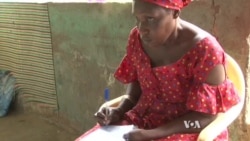More Africans are communicating via text, social media and email.
In Senegal, literacy experts are using the new technologies to motivate and teach women to read. The U.N. Educational, Scientific and Cultural Organization rolled out the program in Dakar in 2012, but is now expanding it to six other African countries.
Mariama Daffe, one of the program's participants, is learning to write and work with numbers.
She sits in front her TV at her house in the Diamaguène part of Pikine, a low-income suburb of Dakar. Daffe started this at-home study program a year ago at the age of 39.
UNESCO partnered with the Ministry of Education to create these literacy modules. They run daily on state television. Some days, it is counting, other days, it is spelling.
The lessons have made some of the women more independent.
“These days I have my mobile phone and I can read messages and I can send messages too,” Daffe said. “I do not have to go to anyone else to give them my mobile phone to read it for me.”
After finishing her lesson, Daffe prepares dinner for her husband and three kids. She finds the lessons to be convenient and manages to fit in three modules a week even though she works full-time and commutes two hours by bus each day.
Senegal has limited funds to teach literacy and at-home study programs are cheap and easy to manage. However, some women do prefer the classroom.
At an elementary school just 10 minutes down the road from Daffe's house, women practice writing French in cursive on the chalkboard.
At least two-thirds of illiterate adults in Senegal are women, but Astou Keita, who is 39, says it is never too late to learn.
“My kids laugh at me. They think it is funny that I started learning at this age," she said. "When I make mistakes, they correct me. But I feel very proud of it and I have nothing to regret.”
Instructor Mamadou Diallo rigs up the interactive display wall using a projector and his laptop. The students use the wall during the math portion of the class.
Diallo says the first time the women saw the interactive display wall, they were mesmerized and anxious to try it. He told them "first we need to work on the chalkboard before we can start the math." He says it has been a joy for them to learn how to use new technology.
Diallo turns to the class and asks a student to read the word problem and perform the first calculation. Mame Ndack Mboup, 50, raises her hand and begins reading the writing on the chalkboard.
“We are going to the store to buy three chickens for 3,500 CFA each,” she said, reading out loud. “How much money will it cost in total?”
She takes the pen and pauses before she begins to write. She then calculates on the wall, multiplying 3,500 by three.
UNESCO gives money to each class to invest. Mame Ndack Mboup is treasurer for the class-run business. The women buy food in bulk and sell it for profit. They practice these transactions in the classroom.
Mboup says they started with about $100 and brought onions in bulk for $1 a kilo. The women sold the onions at the market for $1.20 a kilo. So far the class has earned $700.
Classes are held in the evenings, three nights a week.
The classes are free and the women can come as long as they want. UNESCO is expanding the program to Kenya, Nigeria and Gambia with up to six other African countries adopting similar literacy programs this year.





